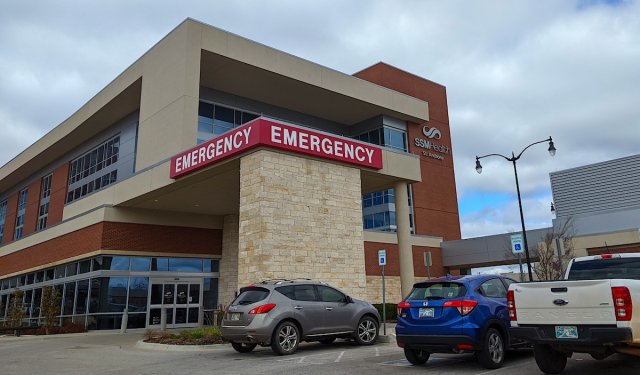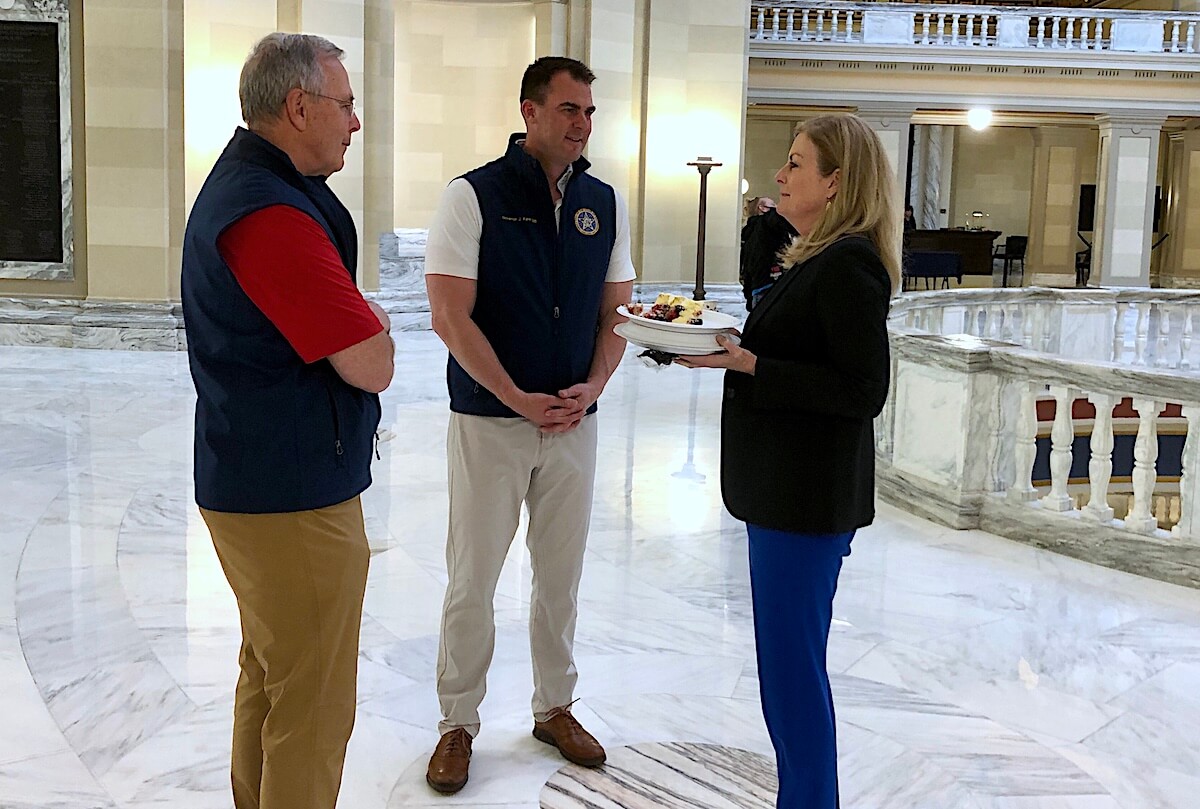

A month after a historic winter storm caused natural gas prices to spike, several Oklahoma hospitals have received “exorbitant” gas bills from their utility providers, with the bills of metro hospital systems ranging from $1.2 million to $11 million for a single month of service.
Overall, more than a dozen hospitals have already received bills that are significantly higher than their average monthly gas expenses, according to Patti Davis, president of the Oklahoma Hospital Association.
“They’re certainly exorbitant,” Davis said. “The numbers that we are seeing are clearly things that the hospital would not anticipate to include in a budget.”
Brian Roberts, vice president for support services at INTEGRIS Health, said his hospital system’s February natural gas was 4,000 percent higher than normal, coming in at about $5.8 million.
“(My) initial reaction was one of significant concern,” Roberts said. “There had to be a mistake.”
INTEGRIS Health operates several facilities in the Oklahoma City metro and around the state. Since 2014, INTEGRIS has purchased its natural gas from Houston-based Symmetry Energy Solutions, LLC, formerly CenterPoint Energy Resource Corp.
Symmetry spokesperson Arielle Rothstein noted that natural gas prices are “set by the market, not Symmetry.”
“Symmetry does not produce natural gas. As a retail natural gas marketer, Symmetry incurs supply costs largely at the time of purchase and appropriately passes these costs along to customers per contracts and rate agreements,” Rothstein said. “Symmetry has been, and is, in regular communication with customers regarding natural gas pricing as a result of the severe weather and will continue to work with the industry and with our customers. Importantly, the considerable increase in demand, coupled with a severe reduction in supply, was a market-wide event and virtually all industry participants were impacted — not just Symmetry.”
Hospital Association ‘trying to get more information’
Other metro-area hospitals are also receiving large bills. SSM Health, which operates St. Anthony Hospital, has received February gas bills for about 12 locations, according to Shasta Manuel, the company’s regional vice president of finance.
“They’re all extremely high,” Manuel said. “Our gas usage in February was 15 percent [more] than in February 2020. But our gas bill was 2,025 percent higher than it was in February 2020 (because of the higher price of gas during the storm).”
For SSM Health, those 12 bills add up to about $1.2 million. In February 2020, they totaled about $57,000.
“We’ve seen Texas getting the majority of the press coverage. We knew that Oklahoma’s gas market had been impacted,” Manuel said. “We maybe shouldn’t have been surprised, but we were.”
Davis said a hospital facing $11 million in charges is the most shocking scenario she has heard of “so far,” although she declined to name that hospital at this point. She said the Hospital Association is still in the process of accumulating data and starting initial conversations with state leaders about the situation.
“We’re just trying to get more information about the scope of the problem right now and how we could address this or inform hospitals about their options,” Davis said.
Roberts asked for state officials to listen to the Hospital Association and find relief for the state’s hospitals.
“Our next step will be to work collectively with the Oklahoma Hospital Association, Office of the State Attorney General and state leaders to seek relief from what we view as unreasonable rate increases during this most recent weather event,” Roberts said. “We would ask our state leaders to be aware, engaged and to support the collective efforts of the Oklahoma Hospital Association and its member organizations as we seek to reduce the significant financial impact in total that this will have on health care providers in the State of Oklahoma.”
Manuel said SSM Health buys its natural gas from Spire, a St. Louis utility that delivers to Oklahoma customers through Oklahoma Natural Gas.
“We’ll work with our vendor. We’ll figure out how we’re going to get through it,” Manuel said. “We don’t have the course of action yet, but we are working through it.”
She noted how hospitals are different from other entities, which could have possibly shut down or lowered their thermostats during the historic storm.
“Patients come first,” Manuel said. “We’re a 24/7 operation, and the care of our patients comes above all else.”
Stitt: ‘Securitization’ on the table for utilities

Sen. James Leewright (R-Bristow) is chairing a select Senate committee focused on the issue of high utility bills after the February storm, and he said Thursday that he is aware of the massive bills received by some hospitals.
“We want to protect hospitals, especially our rural hospitals that are already having a tough time and struggling as it is,” Leewright said.
Gov. Kevin Stitt said Tuesday that he had not “heard specifically” about hospitals facing large bills, but he has been involved in broader discussions with Leewright, other lawmakers, Attorney General Mike Hunter and the Oklahoma Corporation Commission about natural gas costs during the winter storm.
“We heard about some towns and municipalities getting some large, large gas bills, maybe 10 times what they normally are. I think most of the time that’s folks that have been on the deregulated gas side,” Stitt said. “I think the regulated utilities have only just minimally increased bills with consumers and also their corporate clients. That securitization is something we are working on.”
Securitization refers to the financial practice of pooling contractual debt and selling it on a secondary market. For utility providers in this scenario, securitization could involve packaging the cash flow of customers’ increased electricity and gas bills as securities to raise money and pay off the utilities’ debts from the storm.
“We’re looking at [securitization] for regulated and non-regulated (entities),” Leewright said. “The issue, though, is if a business or a hospital went out to a direct marketer. That’s the piece we are still trying to figure out.”
For many large entities — such as manufacturers, hospitals and others — buying natural gas from a direct marketer can be common, and it’s what led to the immense bills they are receiving now. Some entities also have contracts that set a limit on the amount of natural gas they can use at a certain rate, which meant their bills spiked during the February storm after they had to buy extra gas at inflated rates when they surpassed the cap.
“If you think about it and the disasters we’ve had in Oklahoma, they’ve been limited to Oklahoma,” said Manuel, the finance vice president for SSM Health. “I think the issue with this (disaster) is that it happened all the way through the midwest, all at one time, and put the entire country into this critical usage [situation]. It’s the perfect storm.”
Leewright said state leaders are trying to determine what authority they have over unregulated (or direct marketer) gas companies.
“It’s a horrible situation we find everybody in,” Leewright said. “We’re working hard for all ratepayers, including those that have gone to direct marketers. But finding a solution is difficult.”
Senate President Pro Tempore Greg Treat (R-OKC) agreed.
“It’s a multi-layered onion when you start pulling back all the layers,” Treat said.
The Senate leader said Leewright’s group is looking at proposals in nearby states that were also impacted by the February storm or that have securitized debt in the wake of past disasters, like hurricanes.
“Kansas is looking at one model, Texas is looking at a different model. Arkansas is looking at another model. They’re all different,” Treat said. “Some include securitization where the state has bonding authority. Others are just simply allowing the regulated entities to securitize their own debt. And then some are doing modified securitization through the state, plus allowing utilities to do it.”
Treat said some states are also looking at authorizing loans to smaller municipal power authorities that do not have the capitalization of larger utilities.
Regarding entities like hospitals and other private entities, Treat said getting involved in contracts with gas providers can be “a messy nightmare.”
“I would appreciate more information on that,” Treat said. “But these entities that directly contract with some gas provider that subject themselves to a spot price, I’m not sure how much can be done.”
Follow @NonDocMedia on:
‘A very difficult year for our hospitals because of the pandemic’
On Tuesday, House Speaker Charles McCall (R-Atoka) said he had not heard from southeast Oklahoma hospitals about their gas bills. But as a former hospital board member himself, he said he recognizes the problem some hospitals are facing.
“I’m anticipating that they’re coming,” McCall said. “It’s always a challenge in rural Oklahoma with medical care, because you just don’t have a real robust economic base to draw from.”
Davis, the Hospital Association president, said rural hospitals’ increased bills have mostly been in the six-figure range and are problematic for smaller entities.
“It’s important to note that the pandemic has been very disruptive to the normal course of operations of hospitals statewide financially,” Davis said. “It’s just been a very difficult year for our hospitals because of the pandemic, so to now be faced with a weather anomaly that creates once again an unexpected thing to manage, it’s really difficult.”
She said Tuesday that about 15 hospitals had already received dramatically higher bills.
“So, moving forward, it’s going to be interesting to see how this gets reconciled, whether or not the energy companies are willing to work out payment scenarios or what that looks like,” Davis said.
(Editor’s note: The Oklahoma Hospital Association is a financial sponsor of the Sustainable Journalism Foundation. This article was updated at 9:15 p.m. Friday, March 26, to include comment from Rothstein.)




















